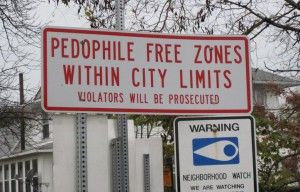CA Supreme Court curbs Jessica’s Law
 In a closely-watched San Diego case, the California Supreme Court dealt a blow to Jessica’s Law. Officially called Proposition 83, it was passed in 2006 by 71 percent of state voters ready for strict limits on where registered sex offenders could live.
In a closely-watched San Diego case, the California Supreme Court dealt a blow to Jessica’s Law. Officially called Proposition 83, it was passed in 2006 by 71 percent of state voters ready for strict limits on where registered sex offenders could live.
It was supported by then-Gov. Arnold Schwarzenegger and former New York City Mayor Rudy Giuliani, as shown in the nearby photo.
Billed as a tough new way to protect children, Jessica’s law prevented “registered sex offenders from living within 2,000 feet of a school or park where children gather, regardless of whether the crimes involved children.” Plaintiffs, four paroled sex offenders in San Diego, argued the rules had the unintended consequence of making it nearly impossible for them to live anywhere, turning a recordation on the registry into a virtual sentence of lifelong transience.
What’s more, they claimed, no public safety interest offset the unforeseen problem.
The justices agreed, striking down the restrictions in San Diego County and freeing would-be plaintiffs around the state to challenge them elsewhere. The court held that, although sex offenders had narrowed their own so-called “liberty interest,” Jessica’s Law went too far in infringing it for no good reason — a violation of constitutional law. They wrote:
“Blanket enforcement of the residency restrictions against these parolees has severely restricted their ability to find housing in compliance with the statute, greatly increased the incidence of homelessness among them, and hindered their access to medical treatment, drug and alcohol dependency services, psychological counseling and other rehabilitative social services available to all parolees, while further hampering the efforts of parole authorities and law enforcement officials to monitor, supervise, and rehabilitate them in the interests of public safety. It thus has infringed their liberty and privacy interests, however limited, while bearing no rational relationship to advancing the state’s legitimate goal of protecting children from sexual predators, and has violated their basic constitutional right to be free of unreasonable, arbitrary, and oppressive official action.”
Lower court action
The move was consistent with inaction from the court last year on an important lower ruling that countered local ordinances cooked up to chase away sex offenders. As CalWatchdog.com reported in May, parents in some areas had begun to pursue a strategy of creating public parks in parts of town where sex offenders could live, specifically for the purpose of making them off-limits.
That led one plaintiff successfully to challenge an Irvine ordinance under state law — and led the state Supreme Court to allow the challenge to stand. Now, the court has taken its rather libertarian approach one proactive step further.
California has not been the only state to reconsider its methods when it comes to the sex-offender bureaucracy. Across the country, reformers have given recent consideration to slimming down registry rolls themselves — risking potential public outcry in an effort to get a handle on the growing problem of an ever-expanding population of permanent pariahs.
High costs
But California, where the costs of coping with sex offenders pile up, has been at the forefront of reform efforts. “The state has spent millions of dollars trying to find housing for some sex offenders, rather than letting them slip under parole officers’ radar,” the San Jose Mercury News reported. “Police in many heavily urban areas struggled to enforce the buffer zone around schools and parks. In Oakland, one motel along Interstate 880 basically became a sex-offender barracks.”
Formulating a successful approach to the state’s sex offenders has become a burdensome task any way the bureaucracy slices it. Last month, the group tasked to oversee that process — the California Sex Offender Management Board — filed its annual report in Sacramento.
In an effort to reverse the costly and inefficient ghettoization of offenders, the board proposed that legislators and Gov. Jerry Brown consider reshaping restrictions on a case-by-case basis. “Having an alarmingly large number of transient sex offenders in California does not make communities safer,” the board argued, counting nearly 6,700 transient registrants and over 1,300 parolees both transient and homeless.
Related Articles
Props 1, 2 would have marginal effect in adding housing
It’s been two and a half years since Gov. Jerry Brown jolted the debate on California’s housing crisis by saying
ALRB forcing unionization on farm workers
UPDATE: It was reported the Agricultural Labor Relations Board has reversed its Monday decision, which would have blocked the Gerawan
CA asset forfeiture reform fails
After passing the state Senate overwhelmingly, California’s bipartisan attempt to reform asset forfeiture laws ran aground in the Assembly, victim of




